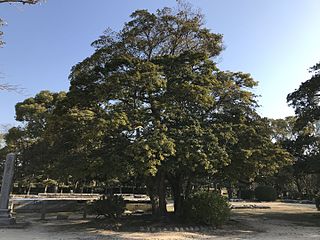
Persea is a genus of about 150 species of evergreen trees belonging to the laurel family, Lauraceae. The best-known member of the genus is the avocado, P. americana, widely cultivated in subtropical regions for its large, edible fruit.

Persea schiedeana, the coyo, is an endangered, evergreen tree in the laurel family (Lauraceae), native to tropical forests of southern Mexico and Central America. Its edible fruit resembles that of the avocado, a related tree in the genus Persea. Other common names include aguacate de montaña, aguacatón, chinini, and yas.
Persea brenesii is a species of plant in the family Lauraceae. It is endemic to Costa Rica.
Persea bullata is a species of plant in the family Lauraceae. It is endemic to Ecuador. Its natural habitat is subtropical or tropical moist montane forests.
Persea campii is a species of plant in the family Lauraceae. It is endemic to Ecuador. Its natural habitat is subtropical or tropical moist montane forests.
Persea conferta is a species of plant in the family Lauraceae. It is endemic to Ecuador. Its natural habitat is subtropical or tropical moist montane forests.
Persea glabra is a species of plant in the family Lauraceae. It is endemic to Brazil.

Persea indica is a large, evergreen tree in the laurel family (Lauraceae), native to humid uplands on Madeira and the Canary Islands in the North Atlantic. It belongs to the genus Persea, a group of evergreen trees including the avocado. It is threatened by habitat loss.
Persea julianae is a species of plant in the family Lauraceae. It is endemic to Suriname.

Persea lingue is an evergreen tree or shrub in the laurel family (Lauraceae), found in Argentina and Chile. It belongs to the genus Persea, a group of evergreen trees including the avocado. P. lingue was historically used in leather production, and is currently threatened by habitat loss.
Persea nudigemma is a species of plant in the family Lauraceae, commonly known as laurel. It is a flowering, leafy plant endemic to subtropical or tropical moist montane forests in Ecuador.
Persea obtusifolia is a species of plant in the family Lauraceae. It is found in Costa Rica and Panama.
Persea pyrifolia is a species of plant in the family Lauraceae. It is found in Brazil and Mexico.
Persea ruizii is a species of plant in the family Lauraceae. It is endemic to Peru.

Quercus liebmannii is a Mexican species of trees in the beech family. It has been found only in the States of Oaxaca and Puebla.

Quercus xalapensis, or xalapa oak, is a species of oak in the red oak group. It is native to the mountains of eastern and southern Mexico, as well as Guatemala, Honduras, and Nicaragua in northern Central America.

Apollonias barbujana , the Canary laurel or barbusano, is perhaps the only species of flowering plants belonging to the genus Apollonias of the laurel family, Lauraceae. It is endemic to the Macaronesian islands of Madeira and the Canary Islands. Molecular phylogenies have found that the species is nested within the genus Persea, closely related to Persea americana (avocado).

Persea borbonia or redbay is a small, evergreen tree in the laurel family (Lauraceae), native to the southeastern United States. It belongs to the genus Persea, a group of evergreen trees including bays and the avocado. Persea borbonia has several common names including tisswood, scrubbay, shorebay, and swampbay.

Machilus thunbergii, the Japanese bay tree, red machilus, or tabunoki, is a widespread species of flowering plant in the family Lauraceae. It is native to Vietnam, Taiwan, southeast and north-central China, the Korean Peninsula, and Japan. A sturdy evergreen tree, usually 10–15 m (30–50 ft) tall, and reaching 20 m (70 ft), it is used for timber, and as a street tree. Its bark is the source of makko, a powder used to make a mosquito‑repelling incense. It prefers coastal areas, and can handle saline soil.










